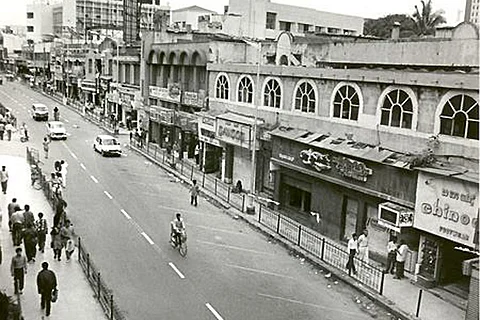

It is not unjustified to call Brigade Road one of Bengaluru’s most famous avenues.
Locals and tourists alike swarm this road, so well known for its food joints and shopping centres. But how much of Brigade Road’s rich history do we know?
According to Suresh Moona, a historian, like Artillery Road and Cavalry Road, Brigade Road too was named after a segment of the British Army – the Madras Pioneers regiment used to be stationed here.
Once upon a time, Brigade Road only housed family-run establishments – a fact that is rather hard to believe these days as international brands stretch as far as the eye can see. Some of the landmarks, however, have stood the test of time.
Nilgiris, for instance, used to be Nilgiris Dairy Farm and was established in 1939. This supermarket is a well-known landmark in Bengaluru, but not many residents know that during World War II, this was the only establishment on Brigade Road that allowed Italian prisoners of war, lodged in Jalahalli jail, to visit.
“They used to have a sign that said ‘inbound’, which meant that prisoners of war could enter the store. Back then, these incarcerated Italians were not allowed to enter commercial establishments that did not have the inbound tag,” recounts KKS Murthy, owner of Select Book Shop, an iconic book store located near Brigade Road.
According to Murthy, the stretch has always represented commercial activity.
“I remember so many restaurants, watchmakers and owners of engineering works had set up shop on Brigade Road. Even today, it is the centre for business activities. So many iconic joints have come and gone, and we can only talk about how great they were,” Murthy recounts. ‘I still remember when Kentucky Fried Chicken replaced what was one of the most-loved Chinese restaurants named The Chinese.”
The farmers' association members had protested in KFC and flung chairs and destroyed property in 1996
The proprietors of The Chinese changed the establishment’s name to Continental in 1962, when India and China were at war. According to Murthy, Continental was where Bengaluru’s elite went to dine, while, across the road, was the cheaper Tibetan establishment – Rice Bowl. “The working class would go to Rice Bowl to eat a less-expensive version of Continental’s Chinese food,” Murthy laughs.
Even the KFC, that stood in Continental’s place, is gone. A Bata showroom came up there in 2015.
The dilapidated, old structure located opposite Rex Theatre was once the Royal Opera House.
The Royal Opera House
Suresh says that far before dancers graced the halls of the Opera House, a venue where boxing matches were held here. “This was during World War II,” he says.
According to him, several Arab merchants had also set up their establishments in what was called the “Arab Lane” in Richmond Town.
“These merchants used to frequent Brigade Road. There were certain establishments, back in the day, that were influenced by them. Brigade Road housed the Omar Khayyam Bar and Restaurant, located somewhere between what is now the beginning of Church Street and Nilgiris. It was frequented by the youth and was shut down some time in the late 1980s,” he adds.
Koshy's, arguably one of the most iconic restaurants in Bengaluru, began as a grocery store in 1940, expanding to what was called Parade Café in 1952. It was later renamed Jewel Box in 1962. The restaurant, now known as Koshy’s, was immensely popular for its English breakfast spread. It moved out of Brigade Road in 1989.
“There was also Kohinoor Restaurant, which was known for its Kerala cuisine, but that also shut down a few years ago. In Curzon Complex, there used to be a disco named Knock Out. During weekends, youngsters would form long queues to buy a ticket to enter this disco. It was about Rs 15 per person back then. In those days, there were barely any vehicles on the roads. There were no cars honking and people could walk in the middle of the road,” Murthy recalls.
Speaking to TNM, PN Rao, who runs an upscale showroom selling customised suits for men, says that change has been the only constant on Brigade Road.
“The landmarks on Brigade Road may keep changing, but for locals some will always remain – for instance, the beginning of the road, where some high-end brands are now located, will always be where the HMV showroom was. We can still identify where Continental stood … The road itself may have changed, but its spirit has never flagged,” he says.
Photos from Facebook page: Bangalore - Photos of a Bygone Era